Is it possible to learn how to sing?
Singeo certainly thinks so.
They argue that anyone can sing, and that they’ve devised a way for you to reliably get better at singing.
But is Singeo worth it?
If you have any interest in signing up with Singeo, or singing lessons generally, then this Singeo review is here to help.
I’ve spent some time using the site and used that experience to tell you all about the pros, cons, costs, refunds, alternatives, and much more.
By the end, you’ll be able to decide whether or not Singeo is right for you.
Before we begin, here’s a quick summary of everything you need to know.
.
Quick summary
Features
- All you need to get started
- Exercises for breath control
- How vocal cords work and how to develop a practice routine
- Vocal range
- Warm-ups and routines for your vocal type
- How to approach and rehearse songs
- Finding your unique style
- Vibrato, falsetto and belting
- Riffs and runs
- How to sight read
- Solfege and singing notation
Pros
- Methodical lessons that ensure rapid improvement
- Helpful resources and visuals
- Engaging and knowledgeable instructors
- Practical exercises
- Active learning community
- Delves into the anatomy of singing
- Tips that can be applied to any style
- Lessons can be tailored to your learning goals
- Uses games and examples to teach difficult concepts
Cons
- Would benefit from even more content (but there is more to come, and what is there is pretty excellent)
Best for: Anybody who’s always wanted to learn how to sing but hasn’t had the chance or has been too afraid to try. Also helpful for more experienced singers looking to develop music theory skills and a comprehensive approach to practice.
Cost: Check latest price for Singeo
Overall: Singeo will help anyone who wants to learn about singing. There is a real emphasis on personal practice, the theory side of singing and helpful exercises for you to improve. By following the Method, you’ll see rapid improvement in your vocal ability and gain a real understanding of your own voice. There’s also loads of helpful additional features and a super vibrant, friendly community to learn with. Everything on Singeo not only comes together to make you a better singer, but a better musician.
In this Singeo Review I’ll be covering:
- What Singeo is, how it works and what a lesson is like
- My review of three courses
- Singeo pros and cons
- Who Singeo is for
- How much it costs
- Refunds and free trials
- Tips for finding great courses
- Other Singeo reviews – Reddit
- Alternatives
And, of course, whether or not Singeo is ultimately worth it.
Let’s go.
What is Singeo?
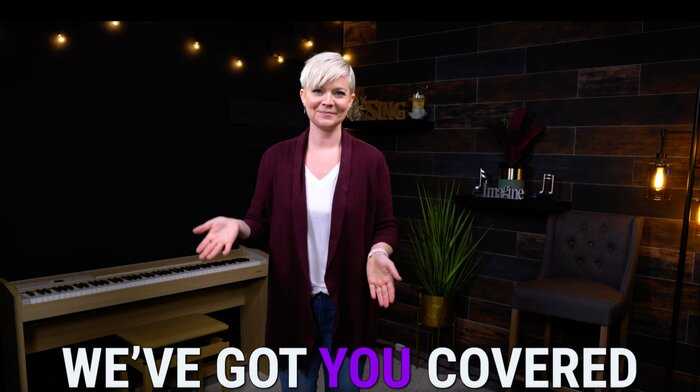
Launched in 2021, Singeo is the newest member of the Musora family, whose platforms include other top musical learning sites such as Guitareo, Drumeo and Pianote.
Singeo focuses on teaching the art of singing. It includes a comprehensive method that will take you from beginner to singing star, individual courses focused on techniques and exercises as well as the chance to get expert teaching on a huge library of songs.
Singeo is also complete with a range of other features which includes routines that will help you find the right warm ups and exercises for your voice, forums to discuss with other learners and live events.
Singeo also pipped the number one spot in our article, Best Online Singing Courses.
How does Singeo work?

Singeo is a subscription-based site. This means that you pay monthly or annually for access to all of the website’s features, including courses, live events and routines.
To get started, the first step is to sign up and create an account using your email address.
You’ll be asked whether you want to pay annually or monthly. Select your preferred option.
There is a 90-day money-back guarantee, so for this period, you’ll be using all the content risk-free.
Once you’ve done all that, it’s time to start learning.
You’ll have access to all of Singeo’s content, and it’s up to you to begin wherever you feel comfortable.
The most advertised and obvious choice is the Method, a 7 level step-by-step approach to singing led by Singeo’s Lisa Witt that aims to cover everything you need to know.
These include:
- You Can Sing – Understanding Your Voice
- Developing Your Voice
- The Not So Secret Ingredient To Singing Better
- Songs – Start To Finish
- Finding Your Unique Style
- Riffs & Runs
- Music Theory For Singers
Each level of the Method is broken up into 6-11 lessons, which range from 3 to 30 minutes. Lessons will often come with assignments, resources and the chance to comment.
But you also have the option of choosing to learn specific courses, try out the routines or browse courses by coach.
What a lesson is like
Singing is a very diverse skill, so no Singeo lesson is the same as they cover vastly different subjects.
However, the site is very consistent in terms of quality. As a result, there are certain things you can expect to gain from a Singeo lesson.
This includes:
- An introduction to a new warm-up, technique or concept
- A breakdown of why the lesson topic is important for your singing
- An example or demonstration from the instructor
- The chance to have a go yourself
- Tips for personal practice
- Additional learning material and resources
My review of 3 classes
In order to review this platform, I spent a while seeing what Singeo had to offer and testing out all their features.
In this section of the review, I’ll go into detail about what I liked and what I thought could be improved for three of Singeo’s courses.
I’ve decided to include Levels 1, 4 and 7 of the Method as this is Singeo’s most popular and comprehensive learning tool.
Because it is designed to get increasingly complicated as you go through each level, whether you’re beginner, intermediate or advanced, you can use this as a guide to see what kind of content you would get from Singeo.
Level 1: You Can Sing – Understanding Your Voice
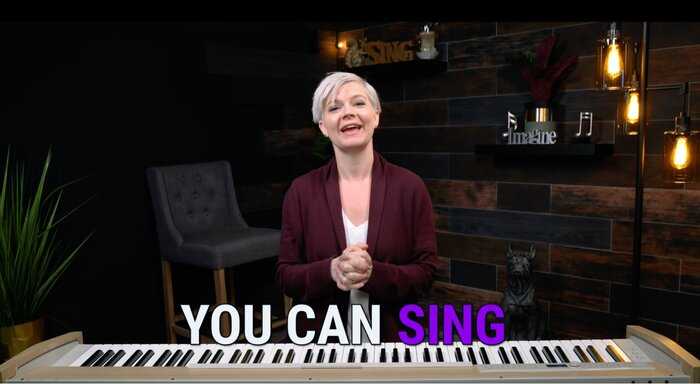
You will learn:
- That anyone can sing!
- The importance of recording yourself and hearing it back
- Beginner techniques for breath control
- The basic science behind your vocal cords
- Why and how the shape of your mouth can change your sound
- How you sing vowels can help you transition from low and high vocal parts
- That it’s ok to feel vulnerable when trying singing for the first time
- Why singing is so much fun
Pros:
- Extra effort into making beginners feel comfortable
- Delves into the anatomy of singing and helps learners really understand their voice
- A bubbly, warm and engaging instructor
- Helpful visuals and high-quality production value
- Technical but accessible exercises
- Stresses the importance of, and gives you tools for, private practice
Cons:
- Could use the opportunity to explain basic music concepts; this will be incredibly useful to singers later down the line
Length of Course: 6 lessons, with each lesson ranging from 5 to 10 minutes.
Best for: Anyone who hasn’t sung before and wants to give it a go. Particularly useful if you feel shy or embarrassed about your voice and think you can’t sing; you can!
Overall: As someone a little shy about their own singing, I found this to be a warm, inclusive and comfortable introduction to using my voice, and I’m sure any beginner would feel the same. Not only was the instructor super friendly and encouraging, but this beginner class spent lots of time focusing on technical exercises and aspects of the voice that are instrumental for any vocalist, all without losing its accessible approach. This is the best way to get familiar with the basics of singing.
Level 4: Songs – Start To Finish
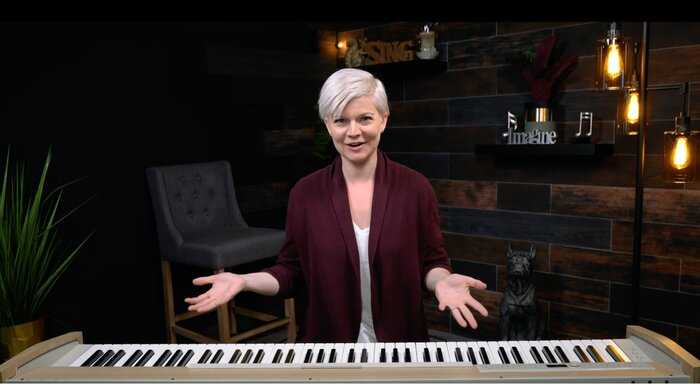
You will learn:
- How to use the piano scale to find your range
- What your voice type is
- The difference between practicing and singing songs
- Active listening; getting a feel for rhythm, structure and instrumentation
- How to practice with the bubble
- Singing with vowels and incorporating lyrics
- Examining problems by recording and listening back
- Using breath to help with phrasing
- A top tip to help with breathing
- Why every song has something to teach
Pros:
- Elementary music theory introduced
- Helps you find your range
- Technical language explained
- Will make you a better all-around musician
- Encourages practice
- General tips that can be applied to any style
- Practical exercises and assignments
- This is the reason why so many people want to sing
Cons:
- Some concepts could be explained in more detail
- Unforgivable confusion of Star Trek and Star Wars
Length of Course: 8 lessons, each lasting 5-16 minutes.
Best for: Anyone who has taken the first three Method courses. This would also be a good place to join if you’re a little more advanced but find there are certain songs that you struggle to sing.
Overall: The main reason most people want to sing is because they’ll hear a certain song that they love and think, “man, I wish I could sing like that.” This course is designed for making that wish come true. All the basics you’ve learnt so far in the Method will come together as you start to get a technical grounding in the art of singing and add to the list of tips and exercises you have already acquired.
Level 7: Music Theory For Singers
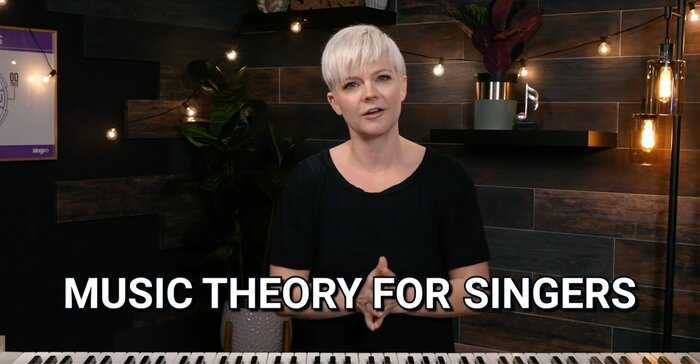
You will learn:
- Music Theory and why it’s important to singers
- Using solfege to understand pitch
- How notation relates to Solfege
- Whole steps and half steps
- Sharps, flats and key signatures
- The importance of singing scales
- Note values of rhythm and practicing them through clapping exercises
- The relationship between rests and breath
- Feeling rhythm by tapping your foot
Pros:
- Eases you into difficult concepts with games and familiar examples
- Teaches you about the language of music
- Covers all bases in terms of harmony and rhythm
- Direct teaching on sight-reading, which many singers struggle with
- Assignments to listen to popular songs to develop your understanding
- Illuminating visuals
Cons:
- Some of these concepts could’ve been introduced earlier and more gradually
- Could do with more explanation; some elements of music theory are described as working ‘just because’
- Could be more content for advanced musicians (this will come)
Length of Course: 9 lessons ranging from 2 to 16 minutes.
Best for: Anyone who has completed all the levels of the Method so far. Also ideal for anyone comfortable with singing and their voice, but has no idea where to start with theory and wants to learn.
Overall: Advance lessons are much harder to teach, as students at this stage will have developed at different levels and will have different priorities. With that said, I do feel like music theory concepts could’ve been introduced slowly and gradually, as I imagine it will be a lot to take in when all put together in one level. However, Singeo maintains its consistency in terms of teaching style, in-depth explanation and helpful visuals. I can’t wait to see where they take the Method from here.
Other Singeo Courses
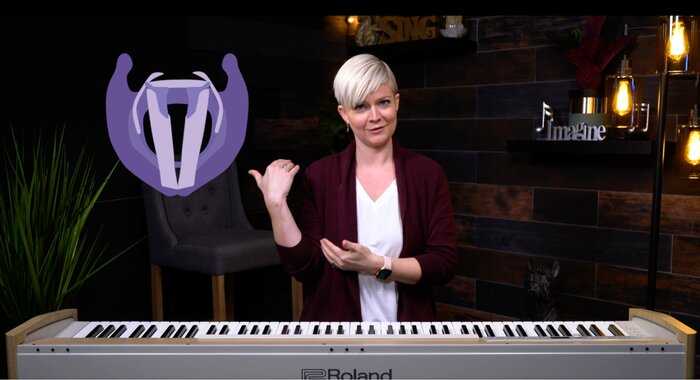
What you’ve just read is a snapshot of what the Method will teach you. I included the absolute beginner classes, the most advanced classes as well as what you’ll learn in between.
Other courses in the Method include Levels:
- 2: Developing Your Voice
- 3: The Not So Secret Ingredient To Singing Better
- 5: Finding Your Unique Style
- 6: Riffs and Runs
But that’s not all.
Singeo also offers courses on a range of more specific topics within singing. Some of these courses are led by other instructors, whilst others are still taught by Singeo’s Lisa Witt from the Method.
These include:
- How To Find Your True Voice
- The Science Of Singing Better
- Singing Starter Kit
- How To Use Singeo
There are also 130+ songs to learn, in a range of styles and disciplines.
Singeo is just getting started, and I’m sure there is so much more to come. But you certainly won’t run out of things to learn if you sign up now.
What I liked about Singeo
Methodically Taught
By far Singeo’s most appealing benefit is its method of teaching.
This goes for both the Method itself and everything else on the site.
Singing is one of the hardest things to learn. Not only is it the type of talent that some people seem to just have without any training, but it’s also one of the most vulnerable and frightening things you can do.
So I was incredibly impressed by how Singeo tackled these two challenges.
Their mantra is that anyone can sing. This is a super positive welcome for beginners and they back it up as well.
Every course I took here included a clear and concise explanation of concepts that are guaranteed to make you a better singer, with practice of course.
They didn’t throw you into the deep end with music theory, but the practice techniques and lesson concepts felt like they would certainly be challenging if you’ve never sung before.
Gradually adding concepts in terms of how difficult they are is the best way to teach any new concept, and Singeo did just this.
There would be a new concept or idea, increasing in difficulty at every stage of the Method. Rather than just letting students learn songs, this teaching style is guaranteed to make them better musicians.
But that doesn’t mean you have to stick with the Method. It’s possible to dip in and out depending on what your learning preferences are.
For example, you can learn by course or by coach depending on whether what’s on offer interests you.
And you can also learn from their 130+ song library, so if you’re more interested in developing repertoire, Singeo has you covered.
This way, Singeo caters to every type of learner.
Helpful resources and a vibrant community
Another wonderful aspect of Singeo is all the resources available.
Each lesson includes a list of resources that you can use once you’ve completed the lessons.
These are designed to help you practice whatever concept has just been explained in your own time.
That way you’ll be fully equipped to move on to whatever’s next in your singing journey.
I’ll talk about how great Singeo’s emphasis on practice is later, but it is so refreshing to have a site dedicated to technology and resources to students’ personal learning.
Singeo is also full of super helpful visuals in the video lessons themselves, as you can probably tell from the pictures.
Wherever there is a new or potentially challenging concept introduced, you can bet there’ll be an on-screen video to help explain it.
This is particularly useful if you’re a beginner learner who just came across a new element of singing you find particularly challenging.
It will also help if you’re more intermediate and came to Singeo to learn the theoretical aspects of singing.
Theory can be difficult and daunting at first, but the visual lessons really help with this.
Another excellent aspect of Singeo is the community it has managed to cultivate. Under almost every video you are bound to find comments from Singeo users.
These are often super positive and friendly. Even is super excited to share their own singing journey, whether it’s asking for help with something they find challenging or sharing an assignment with their own voice.
Singeo staff get involved as well, answering queries and encouraging students.
This all comes together to create an immensely positive learning environment.
Exercises and lots of tips for personal practice
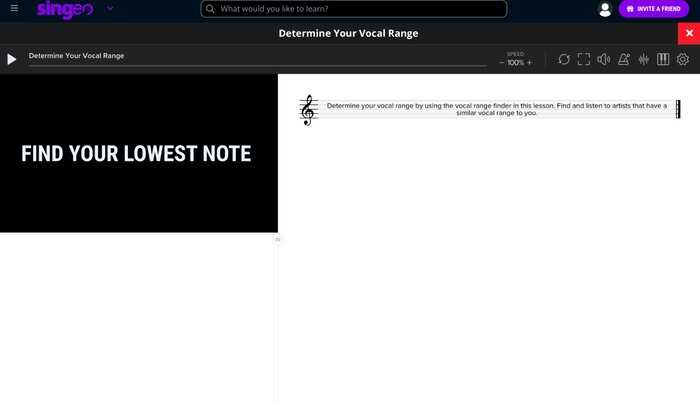
Practice makes perfect.
This holds true for virtually everything, and singing is no exception.
Any good teacher knows that encouraging practice is an essential part of what they do. This includes giving resources and assignments for students to work on in their own time.
Singeo replicates this element of in-person teaching perfectly.
Everything is done with the aim of improving your vocals. And we’ve established that practice is an essential element of this.
As a result, Singeo puts loads of effort into giving things to work on when you have the time to.
This includes assignments to listen and work on songs, trying out warm-ups and, of course, recording yourself.
If you follow the tips they give you, you’re guaranteed to see improvements.
Singing might seem like something people just do.
But at Singeo they really pull back the curtain. This means that you’ll be able to see how the vocal cords actually work in producing sound.
You’ll also receive tried and tested instructions on practice exercises and warm-ups that will improve your sound.
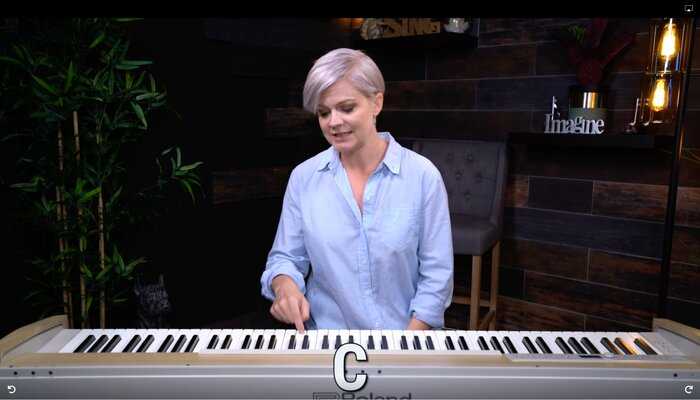
Beginner-orientated
Just a minor point, but one I feel that’s worth stressing.
Singeo puts a lot of effort into being beginner-orientated.
You do not need to have sung a note before for these lessons to be of use to you. If anything, that would make you the ideal candidate.
Singeo assumes that you have no prior knowledge of singing or music generally. You’re like a blank canvas.
With that approach, they can cover all the fundamentals that make someone into a great singer.
The reason I stress this is because I feel beginners are the most likely to not want to engage with Singeo.
As I said, it’s a very vulnerable prospect, so even if it’s something you’ve always wanted to do, it can seem scary.
If that’s you, I can’t stress enough how straightforward, comfortable and easy Singeo is to use.
So, give it a go.
What could be improved
It’s very early stages
So it seems like I’m quite a big Singeo fan. That I can’t deny.
But there’s always room for improvement. And Singeo has quite a lot of room.
This ain’t to say that Singeo has anything wrong with it. On the contrary, I was super enthusiastic about everything I used.
There just isn’t much of it.
This certainly isn’t Singeo’s fault. They were only founded in 2021, and everything is being developed and added to the site as we speak.
Even the Method will probably have more levels.
So whilst this isn’t necessarily a flaw, it is something worth mentioning as I certainly felt like I was wanting more using the site.
If you want a reference for the type of site Singeo will be, check out other Musora platforms like Drumeo or Pianote.
These sites are both excellent in their own regard if a little lacking in their content for advanced students, which hopefully Singeo builds on.
In any case, I was very happy with what is already on Singeo, and I can’t wait to see where they take it.
Who Singeo is for
As is said several times over in the first lessons of the Method:
“Everyone can sing!”
In keeping with the site’s mantra, it is certainly true that Singeo is for anyone with a remote interest in improving their vocal ability.
With that said, there are a few people who I think would especially benefit from lessons with Singeo.
This includes:
- Anyone interested in singing but feels vulnerable or shy about trying
- People who have no prior music knowledge
- Singers looking for lessons on popular songs
- Casual vocalists looking for practical tips and exercises to develop technique
- Anybody who enjoys singing and would like to learn more about their own voice
How much is Singeo?
There are two main options when it comes to purchasing Singeo.
The first option is a monthly subscription. In return for a recurring payment of $30 a month, you’ll receive full access to Singeo song lessons, courses, and coaches, as well as a 90-day money-back guarantee.
The other option is an annual purchase. In return for all the same features as the monthly purchase, you’ll pay $20 per month, billed annually at $240.
Keep in mind that even though annual membership means a bigger initial outlay, it works out $10 per month cheaper than monthly membership. If you are determined to master your voice, this may be a much better deal in the long run.
Either way, considering the skill of singing will stay with you for life, these are some pretty impressive prices.
Singeo free trial
Your first month with Singeo is free.
This means that for one month after you sign up and subscribe, you can access all the content without being charged a cent.
After exactly a month of learning, you’ll begin to be charged in line with whatever plan you initially signed up with, annual or monthly.
Singeo refund
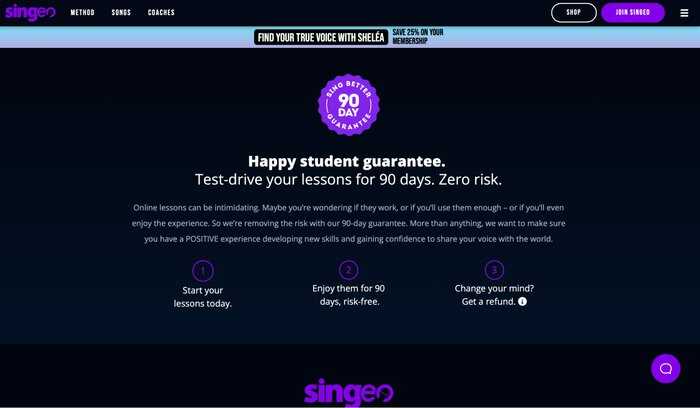
All Singeo courses are available for refund up to 90 days after you have purchased them.
This means that for the first 90 days, you can try Singeo and all it offers with absolutely no risk.
If you aren’t happy with your purchase, contact Singeo Support.
Enter your name and email address and select Refund Assistance in the What Can We Help You With question tab.
Then, write a brief description of why you are not satisfied.
Tips to finding great courses on Singeo
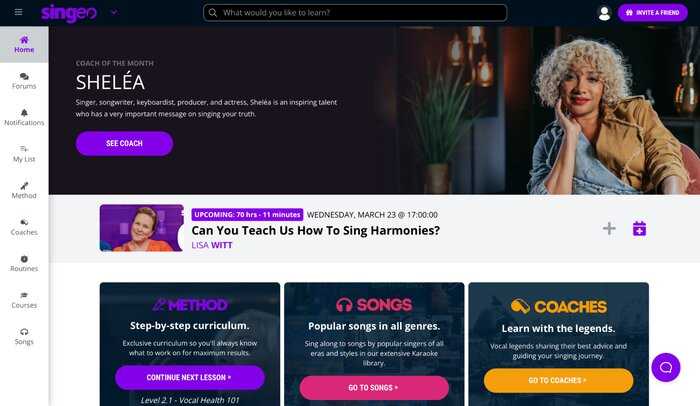
Many people on Singeo will be beginners giving vocal lessons a go for the first time.
As a result, knowing where to start can be quite a daunting task. However, the upside to this is Singeo’s beginner focus makes it really easy to find the right course for you.
The most obvious place to start is the Method, especially if you’re a beginner.
This is because every level of the Method is designed to incrementally improve your ability and expand your knowledge about the art of singing.
By following on from Level One, you can ensure that everything you need to know will be covered.
Once you’ve completed the Method, or if you’re already more advanced than a beginner, there are a couple of options when it comes to finding the best course possible.
This includes browsing by:
- Coaches
- Courses
- Songs
The first two options overlap considerably, so it’s really a matter of preference.
If you browse by Coach, the courses will be organized and presented to you according to whoever is leading them. So, if there is an instructor you’ve heard of or particularly liked, this is a good option.
Comparatively, if you’re using Singeo to develop certain techniques or learn specific concepts, it’s probably better to go by Course.
Finally, you can browse courses by song. So if there is a particular song you’d love to be able to sing, this is the way to go.
Singeo Alternatives
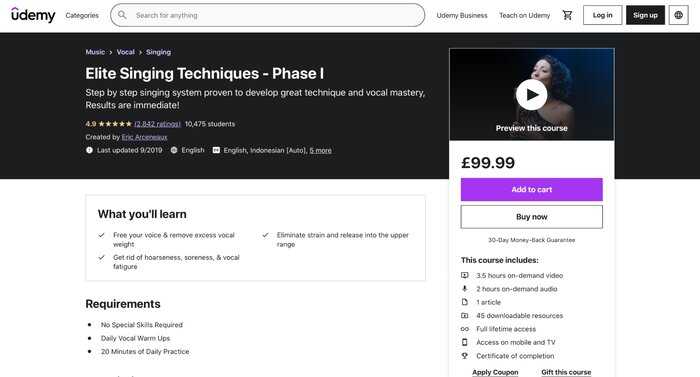
Singeo is part of one of the biggest music learning platforms out there and it made it to #1 in our best singing classes review. But they certainly aren’t alone when it comes to learning how to sing.
To make this review as balanced as possible, I’ve also included alternatives to Singeo.
Singeo vs 30 Day Singer
One of the most popular is 30 Day Singer. This site aims to do exactly what it says, make you a singer within 30 days.
During this time-period you’ll learn how to use your vocal range, develop your vocal power and build confidence in your performance.
There are other sites which offer singing lessons without necessarily making it their whole brand.
One such example is Udemy, whose course Elite Singing Techniques is perfect for any beginner.
Or you could try SkillShare, the producers of Singing Made Easy: Complete Vocal Training System, which boasts over 33,000 students.
MasterClass is one of the most popular e-learning sites right now, specializing in providing lessons with top-quality, world-renowned, often celebrity instructors.
Singing is one of the many disciplines taught by MasterClass, and they have courses curated and led by some of the most famous and acclaimed singers in the world:
- Mariah Carey Teaches the Voice as Instrument
- Christina Aguilera Teaches Singing
- Alicia Keys Teaches Songwriting and Producing
- John Legend on Making Music that Connects
Although not all of these are specifically about singing techniques in the same way Singeo is, there is still so much to learn from these top instructors.
Singeo: what others have said
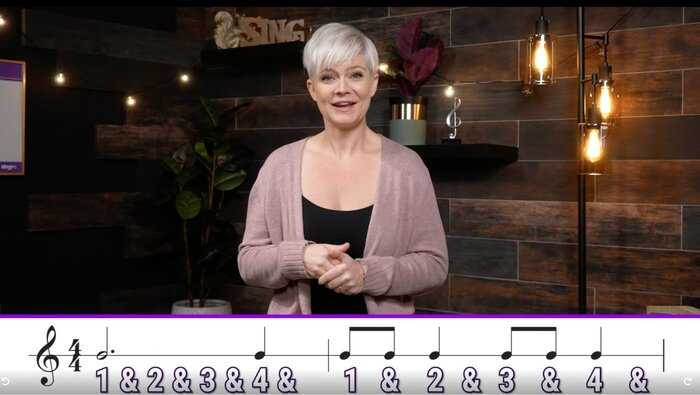
In order to make the most balanced Singeo review I can, I’ve searched the internet to find other people’s opinions on the site and include them here.
Singeo is still very new so there is not too much out there in terms of what people have said.
However, I did find this one comment on Reddit that I feel sums up quite a general attitude towards online lessons many musicians take:
“For me, I see it as a nice complement to the lessons I have with my teacher, but I'm also not as reliant on the student reviews for feedback since I have my teacher -- it can be a week or more after you submit your recording that you get feedback in the student review, but it's a friendly community. They have some free content on Youtube so you can get a general idea of what the teaching style is like.” - Singeo review Reddit
As I said, many in the music industry argue that online lessons are second rate compared to in-person tuition. I don’t necessarily agree, considering the quality of Singeo’s output.
However, this person does raise some valid critiques in terms of how long it can take to get feedback. Nevertheless, they’ve clearly enjoyed using Singeo and engaged with its community.
The only other place to find comments on Singeo is on Singeo itself.
And let me tell you, I could not find a single negative thing.
I’ve spoken about the positivity of the Singeo community before, but I do feel the need to reiterate how much people seem to be enjoying the site.
Some people liked specific aspects of the site:
“I really like the practice options on the bottom of the video. To be able to have the guidance while practicing is extemely helpful.” - Singeo user
While others just wanted to state how much they were enjoying themselves.
“Wow, this is brilliant. I was one of those who used to think she's an Alto.. My range is much, much wider. What an eye opener! Amazing stuff! Thank you, Lisa!” - Singeo user
“So this lesson and every lesson so far has been so helpful.” - Singeo user
Is Singeo worth it?
The answer will depend on a couple of things, but you can probably tell from the positive tone of this Singeo review that I certainly think so.
It is worth mentioning that Singeo is a relatively new site. That means that at the time I trialled Singeo it was not quite at its full potential.
But what is on the site I found to be of a brilliant standard.
There’s an incremental approach to singing, with technical exercise, practice routine tips and examples from your favorite songs.
All of this is united with the aim of taking you from someone with no experience to someone who can confidently sing.
I loved how engaging the instructions were as well as how positive the general community was. Singeo recognises singing is a vulnerable activity, so they do what they can to make you feel as comfortable as possible.
On top of that, I was a massive fan of the emphasis on personal practice. This is so important for any instrument, and any skill to be honest.
Whether it was tips and exercises in the lessons itself or the additional resources provided, the emphasis on personal practice is bound to make any Singeo user an excellent musician as well.
So, if you have any remote interest in singing, check this one out. There might not be much on the site, but what is there is pretty great and there’s more to come!
If you aren’t happy with your purchase, there is always the 90-day mone-back guarantee.
Singeo – Frequently asked questions
A monthly subscription is $30 a month, and an annual subscription costs $20 per month (billed annually). These pieces can be subject to sales and promotional deals.
Singeo offers a money-back guarantee for the 90-days after your subscription.
There are currently 7 levels in the Singeo Method, as well as a handful of smaller courses and over 130 song lessons.
Singeo offers a one-week free trial.

Charlie is a student reading politics at King’s College London. He is also a passionate musician with over 14 years of experience. In his free time, he also enjoys cinema, long-distance running and learning new things.
